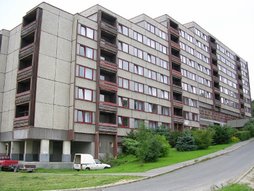Once upon a time, a long, long time ago before this blog came into existence, Rotten mused over the possibility of establishing a site where we could all write up thought-provoking reviews of the books that we've been reading. Well, unlike George Dubya, I have managed to read a book this year, but I can't promise to write anything even vaguely provocative. It's definitely worth a quick line or two though, as I haven't read such a page-turner in a work of fiction in a long time (I usually confine myself to treatises on climate change and environmentalism these days, but as you'll see this book isn't all that far removed from those topics).
It's 'The Road' by Cormac McCarthy and in my very humble opinion it's undoubtedly a modern masterpiece. If you don't know who I'm talking about, you might know one of his earlier books turned into a Hollywood film starring Matt Damon called 'All The Pretty Horses' (I think). I note from other reviews that McCarthy is generally ranked alongside Norman Mailer and Gore Vidal as one of America's greatest living writers. Anyhow, a quick synopsis: The Road tracks the voyage of a father and his son through the apocalyptic wastes of a country (presumably the USA) following some sort of catyclismic event that has destroyed every single living thing on the planet apart from a few humans, including all manner of fauna and flora. The landscape is covered in a thick layer of ash and the days are bitterly cold and very short as a result of a grossly polluted atmosphere. The reader is never told what exactly happened to the planet, although the inference is that a meteor has hit the earth or a thermonuclear war has taken place and the last surviving humans are living through the resultant nuclear winter. All we know is that the father and son are struggling to walk as far south as possible to get to the the sea and a warmer climate. We're given just enough information to guess that the boy was born after whatever catastrophe hit earth and that he's probably about nine or ten years old. As the blurb on the book states: "They have nothing but a pistol to defend themselves against the lawless bands that stalk the road, the clothes they are wearing, a cart of scavenged food - and each other".
Anybody else would have written the story as a science-fiction action thriller, but McCarthy pares back his language to its barest, sparsest bones and creates something bordering on a poetic work as a result. The events that take place as they trudge further south necessarily repeat each other to hammer home the absolute bleakness of life in a corpse of an environment, yet he still manages to somehow conjure just enough hope to keep you guessing as to the protagonists' ultimate fate (I thought there could be only one outcome but I was wrong). Clearly, the only thing that keeps the two going is their love for each other, although the son's affection for his father is sorely tested by the actions he takes to protect his son from any manner of harm. No doubt it's meant to be an evocation of the best and the worst than man is capable of in the face of virtually no hope. To stress the father's devotion to his son, there's a gut-wrenching scene in which the boy's mother demands the right to euthanise her son before she eventually wanders off into the pitch blackness of the night and is never heard of again.
If you've read anything about the likely impact of climate change, then you'll see that this book is not completely beyond the realms of probability. I felt like purchasing a box of razorblades while I was reading it, but I couldn't stop myself completing it anyhow. I'll leave you with one of the more tense moments in the book when they enter a seemingly empty house in search of food:
"He started down the rough wooden steps. He ducked his head and then flicked the lighter and swung the flame out over the darkness like an offering. Coldness and damp. An ungodly stench. The boy clutched at his coat. He could see part of a stone wall. Clay floor. An old mattress darkly stained. He crouched and stepped down again and held out the light. Huddled against the back wall were naked people, male and female, all trying to hide, shielding their faces with their hands. On the mattress lay a man with his legs gone to the hip and the stumps of them blackened and burnt. The smell was hideous.
Jesus, he whispered.
Then one by one they turned and blinked and in the pitiful light. Help us, they whispered. Please help us.
Christ, he said. Oh Christ.
He turned and grabbed the boy. Hurry, he said. Hurry.
He'd dropped the lighter. No time to look. He pushed the boy up the stairs. Help us, they called.
Hurry.
A bearded face appeared blinking at the foot of the stairs. Please, he called. Please.
Hurry. For God's sake hurry.
He shoved the boy through the hatch and sent him sprawling. He stood and got hold of the door and swung it over and let it slam down and he turned to grab the boy but the boy had gotten up and was doing his little dance of terror. For the love of God will you come on, he hissed. But the boy was pointing out the window and when he looked he went cold all over. Coming across the field toward the house were four bearded men and two women. He grabbed the boy by the hand. Christ, he said. Run. Run."
Subscribe to:
Post Comments (Atom)

No comments:
Post a Comment